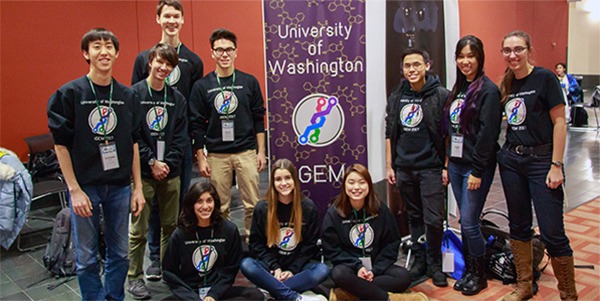In early November, the University of Washington’s student-led undergraduate iGEM team won the silver medal at the 2017 iGEM (International Genetically Engineered Machine) Giant Jamboree conference, held Nov 9-13 in Boston, Mass. The students were among the four US teams to receive the competition’s top 33 awards.
The Giant Jamboree is an annual international competition that gathers more than 300 iGEM teams to present synthetic biology projects to panels of acclaimed judges, other teams and peers. The competition fosters an open community, public engagement and collaboration by allowing teams to learn from each other, and to discuss challenges and findings. It also advances the professional development of participants via workshops, a career fair and networking opportunities.
Started at MIT in 2004, iGEM focuses on the rapidly advancing field of synthetic biology, a discipline that applies engineering principles to design biological components. iGEM is an independent, non-profit organization that promotes synthetic biology’s applications in medical diagnostics, therapeutics, nutrition, renewable energy and more through education, competition and community-building. In addition to its international team competition, iGEM runs a program for academic labs to use the same resources as the competition teams, and the Registry of Standard Biological Parts, a growing collection of genetic parts for building biological devices and systems. Learn more about iGEM.
The University of Washington team presented the culmination of a two-year long project: an autonomous device called the Chromastat. The device aims to reduce the amount of time and effort to maintain cell cultures through real-time, automated analysis of metabolic products in an adjustable turbidostat. Chromastat prioritizes affordability, modularity and ease of use, and could be adapted in the future to include many other kinds of sensors and metabolic pathways. The team presented its proof-of-concept by using Chromastat to characterize the violacerin color metabolic pathway in yeast.
UW’s team consisted of mostly Bioengineering undergraduates, but also included students from biochemistry, physics, applied math, chemistry, mechanical engineering and electrical engineering. The team focused on building an interdisciplinary group to replicate a realistic research environment.
The UW iGEM team offers special thanks to Dr. Liangcai Gu from UW Biochemistry, and Drs. Karen Thickman and Herbert Sauro from UW Bioengineering. Additional acknowledgements:
- Departments of Biochemistry and Biomedical Informatics and Medical Education for offering lab space;
- Departments of Biochemistry, Chemistry, CSE, Biology, Microbiology, Applied Math and EE, and The College of Engineering Student Group grant for contributing operational funds;
- Additional funders throughout the University of Washington.
The team will be recruiting new members for the 2017-18 season in early winter quarter! Interested members should email to uwigem@uw.edu for more information. Anyone interested in synthetic biology, regardless of skill level, is welcome to join.








